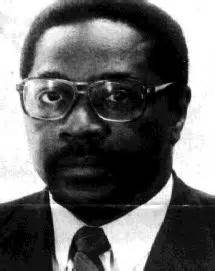Amos N. Wilson facts for kids
Quick facts for kids
Amos N. Wilson
|
|
|---|---|
 |
|
| Born |
Amos Nelson Wilson
February 23, 1941 or 1940 Hattiesburg, Mississippi, United States
|
| Died | January 14, 1995 (aged 53) |
| Alma mater |
|
| Scientific career | |
| Fields | Psychology, Sociology, Black Studies |
| Institutions | CUNY, New York Institute of Technology |
| Influences | Marcus Garvey |
Amos Nelson Wilson (born February 23, 1941, died January 14, 1995) was an African-American psychologist, writer, and professor. He was also a social theorist and a Pan-African thinker. He taught psychology at the City University of New York.
Contents
Amos Wilson's Early Life and Education
Amos Wilson was born in Hattiesburg, Mississippi, in either 1940 or 1941. He went to Morehouse College in Atlanta, Georgia, for his first degree. Later, he earned a master's degree from The New School of Social Research. He then received his PhD from Fordham University in New York.
Wilson worked in several important roles. He was a psychologist and a social caseworker. He also supervised probation officers. He even worked as a training administrator for the New York City Department of Juvenile Justice. As a teacher, he taught at the City University of New York from 1981 to 1986. He also taught at the College of New Rochelle from 1987 until 1995.
Amos Wilson's Ideas on Power and Racism
Amos Wilson had strong beliefs about power and how it relates to racism. He thought that big differences in power between groups were a major problem. He believed that racism existed because some groups had more power than others. For example, he said that white people could practice racism because they had the power to do so.
Education and Solving Problems
Wilson studied Africana studies, which focuses on the history and culture of African people. He felt that Black people around the world faced unique challenges. Because of this, he argued that "equal education" might not be the best idea for them. Instead, he thought education should be designed to meet the specific needs of Black communities.
He believed that the main purpose of education was to help a group of people solve their problems. It should also help ensure their survival and well-being. If an education system did not do this, he felt it was not good enough.
Views on Social Change
Wilson also discussed the idea of "progress" and "integration." He thought that many Black people believed integration would always last. However, he argued that integration might only work well when the economy was growing. If the economy ever got worse, he warned that racial conflict could increase.
Because of this, he encouraged Black people to think about "disintegration" as a real possibility. This meant preparing for different situations, understanding that integration might not last forever.
Racism and Power Structures
Amos Wilson also believed that racism was deeply built into society. He saw it as part of the way power was organized between different groups. He thought racism could continue even if people stopped showing it openly. To truly stop racism, he argued that society's structures and power systems needed to change.
Books by Amos Wilson
- The Developmental Psychology of the Black Child (1978)
- Black-on-Black Violence: The Psychodynamics of Black Self-Annihilation in Service of White Domination (1990)
- Understanding Black Adolescent Male Violence: Its Remediation and Prevention (1992)
- Awakening the Natural Genius of Black Children (1992)
- The Falsification of Afrikan Consciousness: Eurocentric History, Psychiatry and the Politics of White Supremacy (1993)
- Blueprint for Black Power: A Moral, Political and Economic Imperative for the Twenty-First Century (1998)
- Afrikan-Centered Consciousness Versus the New World Order: Garveyism in the Age of Globalism (1999)
- The Developmental Psychology of the Black Child — Second Edition (2014)
- Issues of Manhood in Black and White: An Incisive Look at Masculinity and the Societal Definition of Afrikan Man (2016)
- The Psychology of Self-Hatred and Self-Defeat: Towards a Reclamation of the Afrikan Mind Paperback – (January 1, 2020)
 | Kyle Baker |
 | Joseph Yoakum |
 | Laura Wheeler Waring |
 | Henry Ossawa Tanner |

